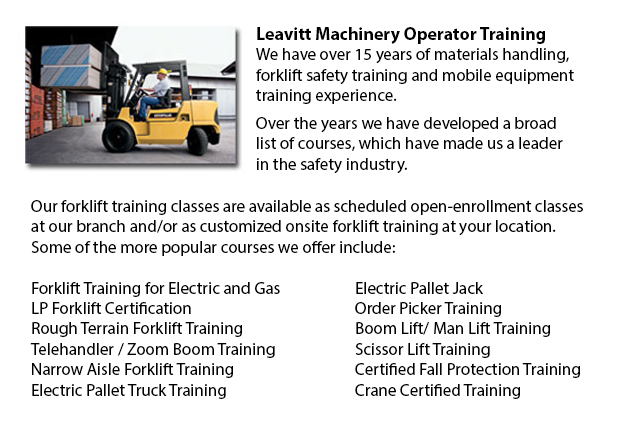
Oakville Forklift Training Classes - Forklifts are a type of heavy lifting machinery utilized in order to handle and move material safely and efficiently. Sometimes referred to as Lift Trucks, they are made use of in various businesses. Workers working around and with forklifts must be trained to spot dangers related with the use of forklifts.
We offer forklift training classes to be able to teach our trainees how to safely utilize a lift truck. The theory portion of the course will include classes and instruction on becoming a forklift operator. Individual training would learn their legal tasks as lift truck operators. Upon completing the classes, a printed certificate will be issued. The certificate must be signed by an individual authorized to verify that a hands-on evaluation has been done within the trainee's workplace.
Forklift Safety
Forklift trucks are essential in industrial workplaces for their ability to transport and lift heavy loads. Forklifts are indispensable to many industrial worksites, but forklifts could be dangerous without correctly training personnel. Forklift injuries, when they occur, tend to be serious due to the power of these heavy machines. Personnel who work regularly around lift trucks could become complacent and forget the dangers. Vital maintenance and operating procedures may be neglected.
Forklift training is necessary not just for new employees. Periodic re-training is important for all operators. First aid training is also vital.
Daily inspection procedures are of critical importance. Lift trucks can become damaged if they are not inspected regularly. Before being used, lift trucks have to be visually inspected as to their general condition. An operational inspection has to be carried out to determine the equipment is properly functioning. The supervisor should be informed if anything is noted that can impact the safe use of the forklift.
A check determines if the area is clear of objects that could pose a hazard. Whatever overhead obstructions must be noted. Check that a working fire extinguisher is accessible. Different levels must be checked, like fuel, radiator water, engine oil, and electrolyte levels in cells. Cables, plugs and batteries must be inspected. Unclog vent caps and ensure that bolts, nuts, chains, guards, and hydraulic hose reels are not damaged, missing or loose. A tire inspection will ensure that wheels are not worn or damaged. Pneumatic tires will need a pressure check.
-
Oakville Overhead Crane Safety Training
Oakville Overhead Crane Safety Training - Overhead crane safety training equips operators with skills and knowledge regarding crane safety measures, accident avoidance, materials handling, and machinery and stock protection. Trainees will learn the t... More -
Oakville Crane Training Schools
Oakville Crane Training Schools - Our various Mobile Crane Operation programs are designed for skilled operators who needs re-certification or certification, and for inexperienced individuals who are seeking their very first job as an operator of a c... More -
Oakville Overhead Crane Certification
Oakville Overhead Crane Certification - The overhead crane certification course is a course that is designed to help trainees, even though they have language or literacy limits. The course consists of a classroom theory part and a practical hands-on... More -
Oakville Forklift Training Programs
Oakville Forklift Training Programs - If you are searching for work as an operator of a forklift, our regulatory-compliant forklift training programs provide exceptional instruction in various types and styles of forklifts, classes on pre-shift inspe... More -
Oakville Fall Protection Ticket
Oakville Fall Protection Ticket - The number one cause of death in the construction business come from fall-related accidents. There is more possibility for fall accidents depending on the types of work being performed within your workplace. Thus, be... More -
Oakville Zoom Boom Training
Oakville Zoom Boom Training - Zoom Boom Training focuses on correctly training potential operators on variable reach forklifts. The training objectives consist of gaining the understanding of the machine's physics and to define the job of the operato... More -
Oakville Aerial Lift Ticket
Oakville Aerial Lift Ticket - A boom truck is often recognized by the cable and telephone company vans that have the elongated arm folded over their roofs. Commonly, a bucket-like apparatus sits at the extension of extendable arms. Often referred to... More -
Oakville Scissor Lift Training
Oakville Scissor Lift Training - Scissor lifts need to be operated competently to be able to protect the safety of the machinery and the safety of people in the workplace. Operators who are skilled are trained to drive the specific model of scissor l... More

Forklift Certification Oakville
TOLL FREE: 1-888-254-6157
Oakville, Ontario
forkliftcertificationoakville.com
Email Us
About Us


